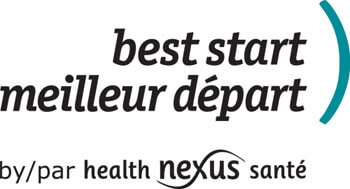| 4 | Preconception | Exposures during pregnancy | Did you know that what you are exposed to during pregnancy can affect your unborn baby’s brain? |
Your baby’s brain starts to develop when your baby is conceived. Exposure to certain everyday substances in your home, workplace and outdoor environment can have harmful effects during pregnancy. Exposures include:
- Alcohol. Alcohol can be very damaging to developing brain cells. It can cause fetal alcohol spectrum disorder, which includes physical, learning and behavioural problems. Babies need more time than adults to process alcohol. The younger the baby, the more immature their system, and the greater difficulty in clearing the alcohol from their body. Choose alcohol-free drinks.
- Tobacco smoke. Cigarette smoke contains thousands of chemicals which can affect the development of the unborn baby. It is best to stop smoking before pregnancy. Stopping or cutting back at any time will make a difference. Ask visitors and other family members to smoke outside. Clearly identify your home and vehicle as smoke-free. Meet with family and friends in smoke-free public places.
- Medications. All prescription drugs should be reviewed with your health care provider. Many common medications are not recommended for use in pregnancy. Discuss these with your health care provider, pharmacist.
- Recreational drugs. During pregnancy, recreational drugs (marijuana, cocaine, etc.) can affect the baby’s growth and development and increase the chance of being born too small. The drugs may also harm the baby’s growing brain.
- Air pollution. High levels of outdoor air contaminants may affect fetal development. Reduce strenuous activity during periods of poor air quality. Vacuum, wet mop and dust regularly with a damp cloth. Dry dusting disperses the dust back into the air and should be avoided. Avoid using scented products, such as air fresheners (including plug-ins), laundry detergents and dryer sheets. Reduce your use of products such as paints, glues, permanent markers, nail polish and aerosols.
- Household cleaning. Avoid products with ammonia, bleach, alcohols, and turpentine. Avoid disinfectant cleaners and antibacterial soaps. Do not change the cat litter yourself.
- Lead. Lead can prevent and harm the development of neurons in the brain. Be careful with old painted surfaces that are peeling. Don’t sand, scrape or burn off the paint. Avoid hobbies that involve lead such as painting with oil paints, glazing pottery and stained glass making.
- Mercury. Choose fish that are low in mercury such as salmon, rainbow trout, mackerel, light tuna, haddock, sole, etc. Avoid mercury fillings. Do not have mercury fillings removed during pregnancy.
- Paint. Avoid painting, refinishing furniture, or using paint thinner or stripper when pregnant or breastfeeding.
- Personal care products. Reduce use of personal care products, especially perfumes, colognes, scented lotions, powders, antiperspirant and hair care products (e.g., shampoos, sprays, gels, mousses). Look for products without “fragrance” or “parfum” in the list of ingredients.
- Pesticides. Stay away if pesticides are applied. Wash fruit and vegetables well. If using mosquito repellents, choose ones with 10% or less DEET.
- Plastics. Do not use plastic in the microwave. Avoid purchasing products (e.g., mattress covers, shower curtains, inflatable toys, vinyl flooring) that are made of vinyl. Vinyl, also known as PVC, gives off strong fumes when new. Vinyl gradually releases phthalates, a plasticizer linked to hormone disruption.
- Exposures at work. Follow workplace safety guidelines, use proper safety equipment and wash hands before eating. If necessary, to avoid exposures, request a transfer to a safer work station.
- Home renovations. Avoid renovating your home if you are pregnant or have young children. If renovation work must be done, plan to be away for the duration of the work and return only once all dust has been thoroughly cleaned up and all fumes have cleared.
Pregnancy is a good time to be as healthy as possible as a family. Both parents can help create a healthy home environment.
Links
- Canadian Partnership for Children’s Health & Environment.
- Hidden Exposures – Informing pregnant women and families about harmful environmental exposures. Toronto Public Health.
